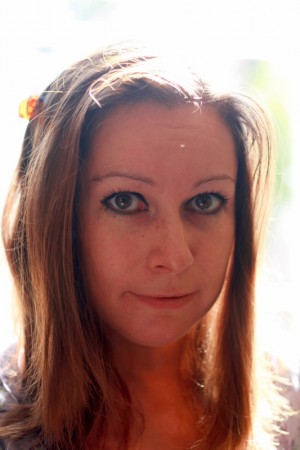You have no items in your cart. Want to get some nice things?
Go shopping
So, my story? Well, it’s your project, of course, but I don’t think there’s much to tell. Married twice, widowed once, two daughters by marriage. I’ve never liked the word ‘stepchild’; it’s a hard, ugly word. And no, I’ve never called myself a stepmother either.
Cassandra Parkin’s New World Fairy Tales, winner of the Scott Prize in 2011, is a collection of modern retellings of traditional stories, set in present-day America. An anonymous college student is travelling the country collecting interviews for a project. The transcripts of the interviews form the stories in the book, each named only by its interview number. The stories they tell are familiar; a girl with a long plait of hair, a beautiful outcast taken in by seven dwarves, a woman going three times to the ball. But they are relocated, reimagined and reinvigorated for a 21st-century reader.
What’s most instantly attractive about these stories is that they are fun. They treat their source material irreverently but affectionately. Ugly step-sisters become ungrateful step-daughters, the three little pigs become racist policemen, Jack becomes a city slicker and the beanstalk the world of corporate finance. There’s much pleasure in this fairy tale spotting, recognizing the bones of the old tales under the skin of the new ones. (Several of the tales are not immediately recognizable, so complete is their transformation.)
The echo here, of course, is the journeys taken by collectors like the Grimms, recording oral fairy tales. But these stories aren’t just knowing nods to older tales. The voices of the interviewees who tell their stories are rich, convincing and complex. They come from across America, from the swamps of the deep South to the skyscrapers of Manhattan.
There was three of us – me, Mike Stone and Randy Lewis – been hunting this guy for days. Robaire Lebrun; a tragic excuse for a man. Sold drugs, pimped his women, beat his momma; an all-roud blot on society. —Interview #9
It starts out the way these things always start: with a phone call. I’m drinking Jack Daniels in the Manderley bar, watching the sunset and the bartender. She’s a hot little Latino number, sweet and simple and satisfying, like ice-cream swirled with caramel sauce. —Interview #27
The voice of the student recording the interviews sometimes tantalizingly peeks through, most vividly in Interview #17, where the interviewee is a down-and-out tramp. “Take your lousy college project and your fucking liberal compassion and your I just rilly feel like there’s a story to be told here, sir, bleeding-heart West-Coast bullshit and get the hell outta here.”

What Cassandra Parkin has brought to her fairy tales are characters. Go back to the originals, and Cinderella is a cipher: she exists only to be mistreated by her step-sisters, to go to the ball, to find her prince. She has no deep thoughts on the matter, no conflicts or neuroses. Traditional fairy tales are all form and no feeling. (In fact, Russian structuralist Vladimir Propp literally reduced them to equations.) Their brightly coloured figures are puppets on a stage, there to keep the story going, and it’s the story that’s the big pull — the amazing, the wish-fulfilling, the fantastical, the bad getting their comeuppance, the good their rewards. But Cassandra Parkin has taken these structures and put people into them. Her Cinderella feels grief, takes on responsibility for reasons hidden to her, struggles with her identity, finds herself and falls in love.
But Parkin doesn’t attempt to turn fairy tales into realism. Her stories are still fables, retaining a flavor of the fantastical. Cinderella is in New Orleans at Mardi Gras time, where she finds an old dressmaker who happens to have three jaw-dropping outfits going spare. The three policemen are targeted by a vengeful and rather wolf-like woman who seems to have the power to blow up (and down) their houses. Jack swaps his father’s cow herd for a job in the city.
This blend of strangeness and familiarity makes for an addictively readable and highly entertaining short story collection.
New World Fairy Tales by Cassandra Parkin is published by Salt Publishing.
Cassandra Parkin was also in the hot seat for our Litro Q&A this week – read her answers here.

About Emily Cleaver
Emily Cleaver is Litro's Online Editor. She is passionate about short stories and writes, reads and reviews them. Her own stories have been published in the London Lies anthology from Arachne Press, Paraxis, .Cent, The Mechanics’ Institute Review, One Eye Grey, and Smoke magazines, performed to audiences at Liars League, Stand Up Tragedy, WritLOUD, Tales of the Decongested and Spark London and broadcasted on Resonance FM and Pagan Radio. As a former manager of one of London’s oldest second-hand bookshops, she also blogs about old and obscure books. You can read her tiny true dramas about working in a secondhand bookshop at smallplays.com and see more of her writing at emilycleaver.net.





My review of New World Fairy Tales by @cassandrajaneuk , addictive, powerful modern takes on old tales @saltpublishing https://t.co/AFTLZiTc
This looks like an interesting book @saltpublishing New World Fairy Tales by Cassandra Parkin | Litro https://t.co/40ulc3aI
Lovely thoughtful review of New World Fairy Tales from @EmilyCleaver at @LitroMagazine https://t.co/YwPuSlZJ @saltpublishing